Do I Need a Credit Card? Pros and Cons Explained
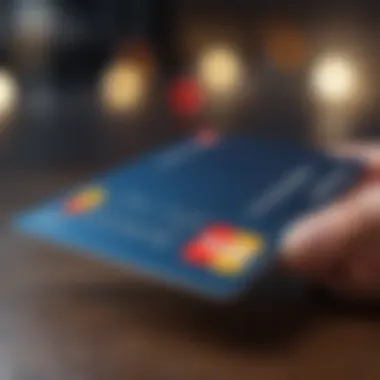
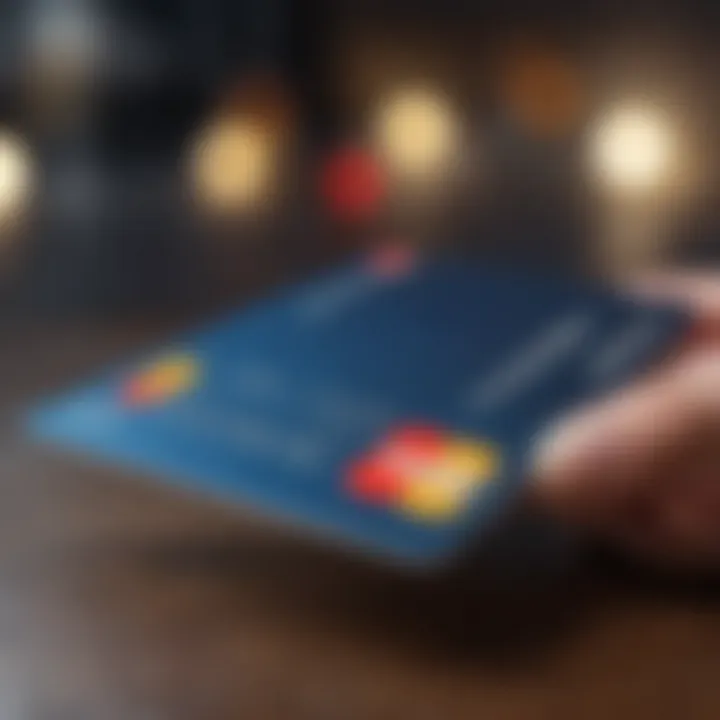
Intro
Navigating the world of personal finance can often feel like traversing a maze. When it comes to credit cards, opinions abound and the discussions can get heated. Some swear by credit cards as tools for financial management, while others believe they are Pandora’s box filled with hidden perils. The question really is: do you need a credit card? To answer that, it’s crucial to understand a few key financial concepts and evaluate your own circumstances.
In this exploration, we’ll break down what credit cards entail, how they can play a role in your financial life, and discuss alternatives that might suit you better.
Understanding Financial Concepts
Definition of Key Terms
To get on the right foot, let’s clarify some terms that will pop up throughout this piece.
- Credit Score: This three-digit number can impact everything from loan approvals to interest rates. Basically, it quantifies your creditworthiness.
- APR (Annual Percentage Rate): This indicates the cost of borrowing. Higher APRs can turn your purchases into expensive mistakes if not managed well.
- Debt-to-Income Ratio: This measures how much of your income goes toward debt payments. A high ratio may indicate financial stress and can affect your credit score.
Importance of Financial Literacy
Understanding these concepts isn’t just academic—it’s imperative for making informed financial choices. A solid grasp of credit cards and their mechanics could save you money, prevent stress, and assist you in reaching your long-term goals.
But hold on—this isn’t all about the negative. There are tangible benefits to having a credit card too, and knowing how to leverage them can lead to impressive gains in financial stability and credit scores.
Investing time to boost your financial literacy equips you to dodge slippery slopes and capitalize on opportunities. Whether you're a young professional just dipping your toes into financial waters, a student learning to budget, or a small business owner managing cash flow, being well-informed can make all the difference.
"Knowledge is power, especially in the realm of finances."
In the next sections, we will delve into practical tips and strategies tailored to your specific financial landscape.
Practical Tips and Strategies
Budgeting Techniques
Effective budgeting lays the groundwork for excellent financial health, and credit cards can either bolster or hinder your budgeting efforts if not used wisely.
- Track Your Spending: Use apps or traditional pen and paper to know where your money goes. Consider categories like essentials, savings, and entertainment.
- Set Clear Limits: If you decide to use a credit card, set monthly spending limits to avoid overspending.
Investment Approaches
If managed responsibly, credit card use can act like a safety net for investments—especially in emergencies. This means having a card may provide you with a financial cushion when opportunity knocks.
- Use Rewards Wisely: Some credit cards offer cashback or airline miles. Using these advantages can help fund worthy investments in the long run.
- Pay on Time: This cannot be stressed enough. Timely payments prevent interest from accruing and help build your credit score, making future investments cheaper.
With this foundational knowledge under your belt, you can assess whether a credit card fits into your broader financial strategy. Next, we will look into the myriad of benefits and downsides associated with credit card usage.
Understanding Credit Cards
When navigating the realm of personal finance, understanding credit cards is akin to having a compass in a dense forest. With a multitude of options and implications, this section sheds light on what credit cards are, how they operate, and why they can be critical to effective financial management. So, let’s delve in.
What is a Credit Card?
A credit card is more than just a plastic piece; it's a financial tool that allows individuals to borrow money up to a certain limit to make purchases. Think of it as a short-term loan from a bank or financial institution, which needs to be paid back, often with interest.
Most commonly, credit cards display your available credit limit, which fluctuates based on your payment habits and creditworthiness. This system can be incredibly useful when cash is tight, but it comes with its own set of responsibilities. Consider this: when you swipe your card at the store, you’re actually tapping into borrowed money that you agree to pay back, usually within a monthly billing cycle. If the entire balance isn’t settled on time, interest can pile up faster than you can say "debt trap."
How Do Credit Cards Work?
At its core, a credit card works through a process of borrowing, paying back, and tracking expenditures. Here’s how it generally breaks down:
- Credit Limit: This is the maximum amount you can charge. Knowing your limit is fundamental; overspending can lead not just to financial strain but also to a hit on your credit score.
- Monthly Bill: Once a month, you receive a statement detailing your transactions, minimum payment, and total balance. You have the option to pay in full or just the minimum. However, carrying a balance can bring interest charges that compound quickly.
- Interest Rates: If you opt to carry a balance, you’ll accrue interest—often annually expressed as an Annual Percentage Rate (APR). Therefore, if your APR is 20% and you owe $1,000, you could end up paying $200 in interest over the year if you don’t pay the full amount.
- Fees: Beyond interest, many cards come with various fees: late payment fees, annual fees, and possibly foreign transaction fees—each a potential landmine for the unwary user.
Understanding these mechanics can help you use credit cards wisely. Making timely payments and keeping balances low can foster a strong credit history—a crucial factor in major life events, such as buying a home or securing a loan.
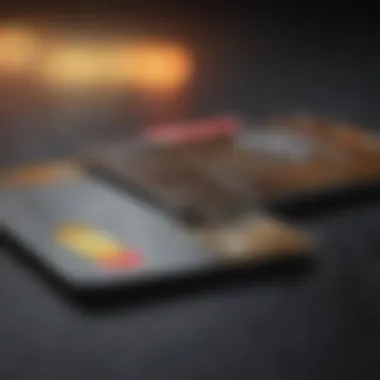
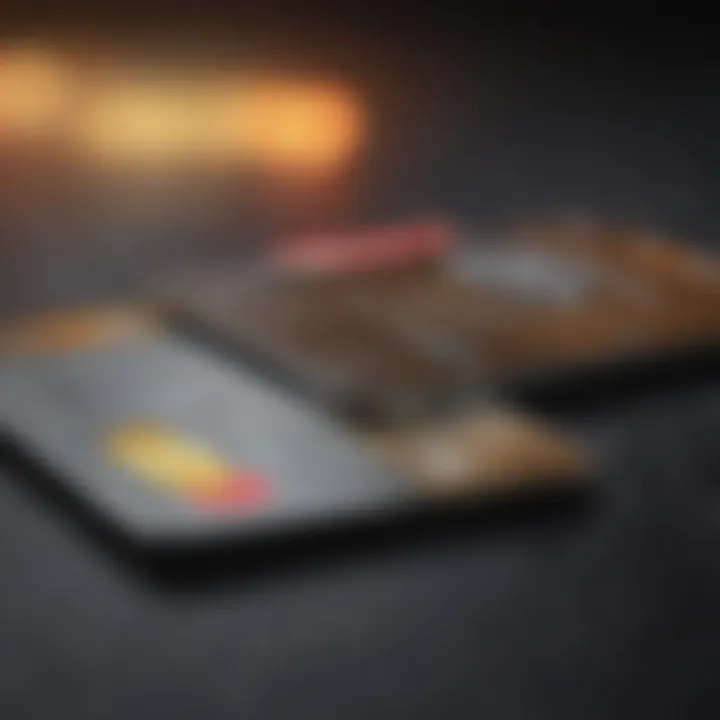
"A credit card can be a helpful financial tool, but it demands responsibility and understanding."
By grasping what credit cards are and how they function, you’re arming yourself with knowledge that can guide better financial decisions moving forward.
The Benefits of Having a Credit Card
Having a credit card can be a game changer for many individuals. With the right perspective, understanding its benefits can help clarify why it might be a useful financial tool. Credit cards aren't just about making purchases. They open up a world of financial opportunities and conveniences that can benefit young professionals, students, and small business owners alike.
Building Credit History
One of the most significant advantages of owning a credit card is the ability to build your credit history. Your credit score is a crucial element in your financial health; it affects everything from loan approvals to interest rates. Using a credit card responsibly helps demonstrate your ability to manage debt effectively. When you consistently make payments on time and keep your utilization ratio low, you’re telling lenders you’re a low-risk borrower. Over time, this can lead to better offers on loans for homes, cars, or even personal endeavors.
Young professionals just starting out may not have much of a credit history, so obtaining a credit card can be the first step in building one. It’s like laying down the cornerstones of a house—without those, the entire structure feels shaky.
Ease of Transactions
Having a credit card makes transactions a breeze. Think about it: whether it’s paying for groceries online or booking a flight in a hurry, credit cards provide a level of convenience that cash doesn’t quite match. You can complete purchases quickly without fumbling through your wallet for cash or counting out coins.
Moreover, many places now prefer card payments over cash due to hygiene concerns or ease of transaction tracking. This reality underscores how owning a credit card can simplify day-to-day life. It’s like carrying a little portal to your bank wherever you go, allowing you to control your spending right when you need to.
"The credit card is not just a necessity; it’s a tool for financial ease."
Rewards Programs and Cash Back
Many credit cards come with enticing rewards programs designed to attract cardholders. This means for every dollar spent, you could be earning points, miles, or even cash back. Some cards offer lucrative deals for specific spending categories like groceries, gas, or travel. For example, put your dinner expenses on a foodie-oriented card, and you might get a percentage back at popular restaurants. Over time, these benefits can add up significantly, allowing you to save or even splurge on something special.
So if you’re someone who regularly pays with a credit card, why not reap some rewards for your everyday purchases? It’s a little like getting paid for the chores you would’ve done anyway.
Emergency Financial Flexibility
It's comforting to know that in case of an emergency, you have a safety net. Credit cards provide an line of credit that can cover unexpected expenses, like car repairs or medical bills. This kind of flexibility can be especially reassuring for young professionals or small business owners who often face unpredictable costs. Having access to an easily available source of funds can avert a financial crisis that might otherwise lead to overwhelming stress.
That said, it’s important to use this flexibility wisely. Credit cards are not a license to splurge but a valuable tool to help navigate financial bumps in the road.
By weighing these benefits against your individual situation, you can make informed decisions about whether a credit card fits your needs. As with any financial product, understanding its fitting into your life can help you see the real picture.
So as you ponder whether to jump into credit card ownership, keep these benefits in mind. They might just tip the scale toward making that decision a positive one.
The Potential Downsides of Credit Cards
When one dives into the world of credit cards, the shiny benefits often grab the limelight. But there’s the other side of the coin—a side that deserves just as much attention. Evaluating the potential downsides of credit card usage is crucial, especially for those newly wading into finances. Understanding these aspects can prevent some costly mistakes down the road and can shape wiser financial decisions.
Accumulating Debt
It’s almost too easy to fall into the rabbit hole of credit card debt. With a simple swipe, you might buy that latest gadget, indulge in takeout, or book that spontaneous trip. However, this convenience can morph into a problem if spending spirals out of control. Unlike cash, credit cards give the illusion of having more disposable income than one actually does.
Consider a scenario: you have a credit limit of $5,000. If you max out that limit on several purchases without an organized repayment plan, you could find yourself facing monthly bills you can’t keep up with. According to a survey from the Federal Reserve, many Americans struggle with credit card debt exceeding their original borrowing by large margins. The mental toll of looming debt can create a cycle of anxiety while lowering overall financial security.
Interest Rates and Fees
Now, let’s throw interest rates into the mix. Credit cards are infamous for towering interest rates that can transform small purchases into significant payments when time drags on. Missing just one due date often unleashes a cascade of fees, further inflating your balance quicker than you can say "financial woe."
"Credit cards can be like a double-edged sword; they offer freedom but can just as easily lead to financial bondage."
For example, if you carry a $3,000 balance with a 17% annual percentage rate (APR), that’s around $510 in interest if only the minimum payment is made each month. Fees for late payments, over-the-limit charges, and even foreign transaction fees can also sneak up on you, adding unnecessary strain to your finances. It’s essential to scrutinize the fine print before signing up for any card.
Impact on Credit Score
Often, credit users don’t consider how their habits influence their credit scores. Credit cards are a double-edged sword in this realm as well. On one hand, consistent, on-time payments can build a strong credit profile, which is crucial for securing loans or favorable interest rates. On the flip side, mismanagement can tank your score.
Late payments, maxing out your limit, and even applying for multiple credit cards in rapid succession can tarnish your score. In the world of credit scores, it doesn't take much for a poor decision to linger like a heavy storm cloud over your financial future. Young professionals starting their journeys often overlook this, thinking of credit scores as abstract; it’s better to treat them like a monitoring tool.


Psychological Effects of Spending
A lesser-discussed downside is how credit cards can warp our perception of money. The immediate gratification that comes from spending can create a psychological disconnect from our actual financial health. When someone knows they can charge a coffee instead of pulling out cash, spending becomes less conscious.
Repeatedly utilizing credit cards can encourage reckless spending patterns. Behavioral scientists suggest that the ease of tapping a card creates a phenomenon called "spending disassociation"—where one doesn’t feel the full brunt of the financial impact of purchases. Over time, this can lead to an unhealthy approach to money management and hamper one’s ability to budget effectively, which is essential for long-term financial stability.
By recognizing these potential downsides, individuals can make more informed choices about whether they should add that shiny piece of plastic to their wallets. Awareness is powerful, and understanding your relationship with credit can lead to healthier financial practices.
Alternatives to Credit Cards
When considering the landscape of personal finance, it’s vital to take a moment to understand what alternatives to credit cards exist. Many individuals find that a credit card does not fit into their financial strategy or lifestyle, leading them to explore other tools that can achieve similar ends without the risks associated with credit card debt. Here’s a look at some practical options that can serve your financial needs.
Debit Cards as an Option
Debit cards are perhaps the most straightforward alternative to traditional credit cards. Linked directly to a checking account, these cards allow users to spend money they already have rather than borrowing on credit. This feature can significantly reduce the chances of falling into debt, since the spending limit is essentially your existing bank balance. Furthermore, debit cards are widely accepted, making them a convenient choice for everyday purchases.
"Spending what you have feels liberating—less worry about monthly bills."
They also often come with fewer fees compared to credit cards, such as avoidance of late payment charges. However, do note that debit cards might not offer the same rewards programs, so if you’re a big spender who enjoys perks, you’ll want to evaluate the trade-off.
Prepaid Cards
Prepaid cards represent another solid alternative, acting similarly to gift cards. Users load a set amount of money onto the card, which can then be used for purchases until the balance runs out. This mechanism instills discipline in spending habits as it limits expenditure to the amount preloaded onto the card.
Moreover, prepaid cards are usually available to anyone, regardless of credit history, making them accessible and a useful tool for budgeting. However, one must be cautious of potential fees related to loading money onto the card or monthly maintenance fees. It’s prudent to read the fine print before committing.
Cash Transactions
While cash transactions may seem outdated to some in this digital age, they’re an effective method for managing finances. Paying with cash can inherently curb excessive spending; it’s this tactile engagement with money that often makes people think twice before parting with it. Using cash encourages more mindful spending and can help keep your finances on track.
However, cash does have its downsides. It can be inconvenient for larger transactions or unexpected emergencies. Plus, it offers no recourse for transaction disputes, unlike credit cards. So, while cash may be effective, consider the context in which you’re using it.
Fintech Solutions
The rise of technology has given birth to numerous fintech solutions that can function as viable substitutes for credit cards. Applications like Venmo, Cash App, or even specific budgeting apps, allow for seamless transactions without the liability that comes with credit cards. Users can send or receive money quickly and manage their finances in innovative ways.
Moreover, some fintech solutions provide features such as budgeting tools, instant notifications for transactions, and savings programs that traditional banks may not offer. However, it’s essential to stay aware of the fees associated with these services and consider the level of security they provide, as some services may not be as regulated as traditional banking.
Overall, exploring these alternatives to credit cards not only broadens your financial toolkit but also helps you identify which approach aligns best with your spending habits and financial objectives. Each option shines in certain scenarios, and understanding their unique benefits and drawbacks can empower you to make informed choices about your finances.
Assessing Your Financial Situation
Understanding your financial situation is like peering into the engine of a car before a long trip. You need to know what’s under the hood to navigate the road ahead safely. Just as you wouldn’t want to get stuck on the side of the road due to a mechanical failure, a clear picture of your finances is crucial before deciding whether you need a credit card.
Understanding Your Spending Habits
Spending habits serve as the compass guiding your financial decisions. Take a moment to list out your regular expenses, both necessary and discretionary. Do you often overspend on dining out or the latest tech gadgets? Grasping where your money is going can be an eye-opener. This understanding helps in two main ways. First, it allows you to identify areas where you can cut back; second, it helps you to determine if a credit card could actually enhance your budget management. For instance:
- Regular vs. Occasional Expenses: Knowing the difference can help you gauge whether a credit card can assist in managing recurring bills more efficiently.
- Impulse Buying: If you find yourself often swayed by non-essential purchases, you might be better off steering clear of credit cards, which can draw you further into debt.
Evaluating Your Financial Goals
Setting clear financial goals acts as a roadmap to your monetary aspirations. Are you saving for a dream vacation, a house, or retirement? Think about what you truly want to achieve in your financial life. If you're focused on paying off debt or saving aggressively, a credit card might not be the right tool for you.
Consider creating a list of your goals with corresponding timelines. For instance, if you wish to buy a car in three years:
- Short-term goals (1-2 years): These might include saving for a security deposit on an apartment.
- Long-term goals (3 years or more): This could be building an emergency fund or starting a retirement plan.
A credit card can aid in building your credit history if you plan to make significant purchases in the future, but it's essential to weigh that benefit against your current financial situation.
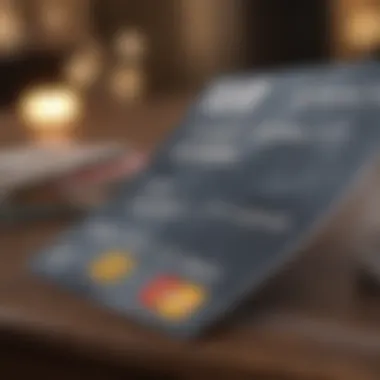

Risk Tolerance and Financial Responsibility
Everyone has a different level of comfort when it comes to financial risk. Knowing your risk tolerance is like sizing up a steep hill before deciding to hike it. Are you the cautious type, or are you more of a daredevil with your cash? Being honest about your risk tolerance can inform your decision regarding credit card usage.
Here are some factors to consider related to risk:
- Debt Aversion: If the mere thought of owing money puts you on edge, a credit card may not be for you.
- Income Stability: Is your job secure? A fluctuating income source could spell trouble if unexpected bills come your way.
- Spending Discipline: If you suspect that having a credit card will lead to overspending, it may be wise to pause and reconsider.
"Understanding your risk tolerance can prevent financial missteps that derail your plans."
Ultimately, assessing your financial situation involves a introspective look at your habits, goals, and relationship with money. Taking the time to understand these elements can save you from the potential pitfalls of credit card debt and set the stage for more informed financial decisions.
When a Credit Card May Be Necessary
Deciding whether or not to use a credit card can feel like treading water in a turbulent sea. There are times, though, when carrying a credit card may be less about convenience and more about necessity. This section dives into situations when credit cards become not just useful, but crucial. By somtimes viewing credit cards with a skeptical eye, you might miss the scenarios where they can provide vital support to your financial health.
Travel and Foreign Transactions
When you're off on a grand adventure, whether to the bustling streets of Tokyo or the picturesque shores of the Amalfi Coast, a credit card comes in handy. Most travelers can attest to the ease they provide. Imagine trying to book a last-minute hotel, and they only take credit cards—definitely a damper if you're flush only with cash. Credit cards often offer better exchange rates compared to traditional foreign exchange services, meaning you might save a few bucks that can be put toward a gourmet meal or souvenir.
Additionally, using a credit card can offer a layer of security while you roam. If that card gets lost or stolen, many companies have measures in place to quickly resolve issues. It's a comforting thought to know you won’t be left in a bind, given that modern-day thieves are often lurking around every corner. As a cherry on top, several credit cards also come with travel insurance coverage, which can cover unexpected hurdles, such as trip cancellations or delays, providing peace of mind as you journey.
Building Credit for Major Purchases
It’s not just about getting by day-to-day; life can throw big financial curveballs. When it comes to major purchases, such as a car or a home, having an established credit history is crucial. In these situations, using a credit card responsibly can bolster your credit score. This score, in numerous instances, will determine the interest rates you are offered, which can save you serious cash in the long run.
When you show that you can handle borrowing money responsibly—by paying your credit bill on time and not exceeding your limit—lenders may be more inclined to offer you a loan with favorable conditions. It can feel like achieving a gold star in the financial realm, allowing you to not only make big purchases but do so with confidence and even a sense of pride.
Online Shopping Security
In this digital age where shopping online is as common as breathing, a credit card serves as a protective shield. With the increasing frequency of data breaches and online fraud, using a credit card can act as a buffer between your hard-earned money and fraudsters. Unlike debit cards that pull directly from your bank account, credit cards offer certain protections against unauthorized transactions. If you notice suspicious activity, reporting this to your card issuer can often result in a rapid resolution, minimizing potential financial loss.
Furthermore, many credit cards come with features like fraud monitoring, real-time alerts, and even extended warranties on purchases. These added layers of protection ensure that your online shopping experience remains as safe as possible, allowing you to shop without the weight of worry.
Choosing the right credit card can be the difference between a positive and a negative financial experience. Take your time, do your homework, and consider what benefits each option offers in today's world.
In essence, whether it’s traveling abroad, making a significant purchase, or simply wanting to shop safely from home, having a credit card can make all the difference. It isn’t just a piece of plastic; it’s a tool to enhance your financial flexibility and security.
Culmination: Making an Informed Decision
The journey through the world of credit cards has provided a wealth of insights and considerations that require careful thought. Your decision regarding whether to adopt a credit card is intertwined with numerous elements, including your financial habits, goals, and personal circumstances. Let's break this down further.
Weighing the Pros and Cons
When it comes to credit cards, weighing benefits against drawbacks is crucial. On one hand, they offer the potential to build credit history, which can come in handy when making significant purchases like homes or cars. Credit cards can provide convenience and potential rewards like cash back, travel points, or discounts.
However, there are downsides as well, such as the temptation to overspend or the risk of accumulating debt. Interest rates can be a beast if bills are not paid on time. One must take a step back and honestly assess personal discipline when managing a credit card.
- Pros:
- Cons:
- Building credit history
- Convenience for transactions
- Rewards programs that bring benefits
- High-interest rates and potential debt
- Risk of negatively impacting credit score
- Psychological effects that lead to overspending
Understanding these factors can arm you with better choices, whether that’s to embrace or eschew credit cards.
Personal Circumstances and Future Considerations
Every person's financial situation is like a fingerprint—unique and personal. Young professionals might have different needs than small business owners or students. Think about your financial landscape now and where you hope to be in a few years. Having clarity on your priorities makes a substantial difference. For example, if you're looking to make a large purchase soon, establishing credit through responsible credit card use could be pivotal.
Moreover, consider future events that could affect your finances, such as pursuing higher education or starting a family. Your risk tolerance also plays a role. Some folks are comfortable with a bit of debt for the benefits, while others may prefer a conservative approach.
In summary, making an informed decision about credit cards isn't just about weighing advantages against disadvantages, but also about introspecting on personal needs and future plans. Always ask yourself:
- What financial goals do I have?
- How do I handle my money now?
- Am I prepared for unexpected expenses in the future?
Answering these questions truthfully can guide you toward the smartest decision regarding credit cards.







